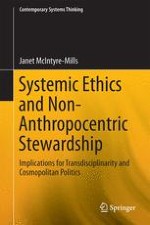
2014 | OriginalPaper | Chapter
1. Cosmopolitan Politics
Making a Case for Systemic Praxis
Author : Janet McIntyre-Mills
Published in: Systemic Ethics and Non-Anthropocentric Stewardship
Publisher: Springer International Publishing
Activate our intelligent search to find suitable subject content or patents.
Select sections of text to find matching patents with Artificial Intelligence. powered by
Select sections of text to find additional relevant content using AI-assisted search. powered by